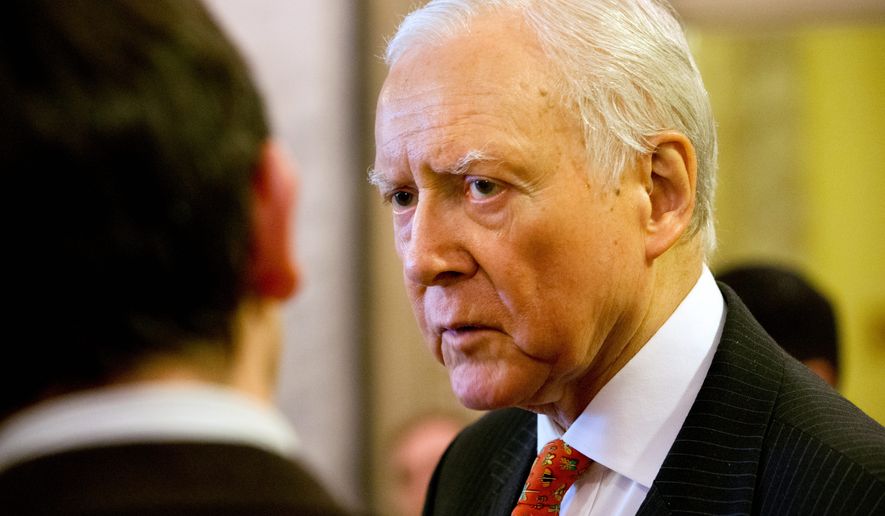Sen. Orrin G. Hatch wants to see the Supreme Court strike a blow at Obamacare this year — but the Utah Republican’s own words are being used by the Obama administration in that court case to defend the law.
Five years ago, Mr. Hatch wrote an op-ed that seemed to see no difference between health exchanges set up by the states and ones set up by the federal government, noting Washington planned to “step in and do it for them” should states refuse to start their own.
That distinction between the types of exchanges is the crux of the court case, with the justices expected later this year to rule on whether residents in states that use the federal exchanges are able to get tax credits to help them pay for insurance.
Without the subsidies, most would likely refuse to buy coverage, undercutting the economics of Obamacare.
Mr. Hatch’s spokesman says Democrats are “grasping at straws” in trying to use his words to defend the program’s legality, but the longtime senator becomes just the latest key player who has weighed in on Obamacare over the years, only to see his words used against him in the subsidies case King v. Burwell.
The list started with Jonathan Gruber, an MIT professor who worked on the law and then undermined it in public speeches.
SEE ALSO: D.C. joins effort to release the wrongly convicted after exonerations climb nationwide
Since then, the list has expanded to the law’s foes, such as Mr. Hatch and Wisconsin Gov. Scott Walker, a Republican who in 2013 said there was “no real substantive difference between a federal exchange, or a state exchange, or the in between, the hybrid, the partnership.”
Rep. Paul Ryan, Wisconsin Republican, said in 2010 there appeared to be little difference between the state-based exchanges in the final bill and a House version that called for one big federal exchange, and that “just about everybody in this country” could qualify for taxpayer subsidies if they made less than $100,000 and health insurance took a large slice of their income.
Obamacare’s Democratic authors used the former vice presidential candidate’s words against him in their brief to the Supreme Court.
The justices will decide by June if the Affordable Care Act reserved the subsidies for exchanges “established by the state,” as the law dictates. Mr. Hatch and Mr. Ryan signed onto a brief that says the court should adhere to a strict reading of the law.
Administration attorneys say the Health and Human Services Department may stand in the shoes of 34 states that opted to use the federal portal known as HealthCare.gov, so customers who live in those states are entitled to tax credits, too, under IRS regulations.
In cases like these, it is fairly common for interested parties to “use whatever they can to flavor their arguments in the briefs,” said I. Glenn Cohen, a health law expert at Harvard Law School.
SEE ALSO: Obama amnesty would save feds $7.5 billion: CBO study
But that doesn’t mean the justices will tune in.
“All the justices will focus on the text itself, and while a few may look at legislative history, I would be quite surprised if media comments are used as anything but a rhetorical device in the opinions,” Mr. Cohen said.
Timothy Jost, a law professor at Washington and Lee University who studies and supports the health care overhaul, said the weight granted to selective quotations will depend on the individual justices.
Some justices will look to them for insight into legislative intent, particularly if the comments were made before the law’s passage.
Others, such as Justice Antonin Scalia, are textualists who focus on the strict meaning of the words in the statute.
“The only thing that matters to them,” Mr. Jost said, “is their dictionary.”
That hasn’t stopped partisans from cherry-picking quotes from the five-year-old battle over Obamacare and holding them up — in legal briefs and the court of public opinion — as proof that their opponents have re-envisioned Congress’s will.
Mr. Hatch’s quote comes from a January 2010 op-ed in The Wall Street Journal, in which he blasts Obamacare as unconstitutional for several reasons, including its approach to the exchanges.
“This is not a condition for receiving federal funds, which would still leave some kind of choice to the states,” he wrote. “No, this legislation requires states to establish these exchanges or says that the Secretary of Health and Human Services will step in and do it for them.”
The senator’s office says that despite the administration’s claims, he was not referring to the subsidies when he spoke of federal funds.
While the administration relies on Mr. Hatch, the other side is pointing to Mr. Gruber, the MIT professor who made a series of impolitic and politically damaging remarks about the law in video-recorded speeches.
In one clip, he said that states that refused to set up exchanges would be forfeiting tax credits — a position that appears to undermine the administration’s stance in King.
Mr. Gruber told Congress he was referring to a hypothetical situation in which the administration decided not to set up a federal exchange.
The King challengers mention Mr. Gruber six times in their main brief, citing his speech as evidence that Congress wanted to entice states to set up their own exchanges.
“The Act’s incentive function was well understood by, among others, Jonathan Gruber, a leading ACA architect and HHS consultant who helped draft the legislation,” they wrote.
By contrast the administration, which used to cite Mr. Gruber’s work in defending the law, has reduced the economist to a footnote in their latest filing.
At the bottom of page 50, the administration says his comments “were made two years after the Act was passed, and Gruber has clarified that they were taken out of context.”
• Tom Howell Jr. can be reached at thowell@washingtontimes.com.




Please read our comment policy before commenting.